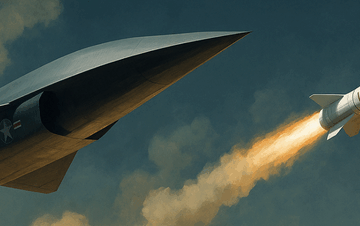At the annual convention of the National Guard Association of the United States (NGAUS), former President Donald Trump made headlines by stating his support for NGAUS’ position on a Space National Guard. He said there should be one and that it should be the “primary combat reserve of the US Space Force.”
While this is a welcome comment from the former president, it is not a new argument to have a Space National Guard. This argument, however, was much maligned, mocked, and ignored for years. Lately, much reporting on the topic is misinformation that confuses both the American people and Congress.
Many who oppose the Space National Guard wrongly believe that space defense is a strictly federal mission. They believe the Guard’s deployable space operations, a function since the 1990s, and the nearly 300 years of the Guard’s legal and constitutional role does not justify a Guard element for Space Force. They argue that bypassing the constitutional framework and the law of the land, which requires a governor’s consent on decisions regarding their state guard forces, is a “one off.”
If the federal government is allowed to eliminate the role of governors, this would set a dangerous precedent. During congressional testimony, Secretary of the Air Force Frank Kendell discussed a legislative proposal that would do just that and suggested that going around the law “is not a big deal” and that National Guard is “an artifact of history.” Legislation requiring the support and inclusion of governors is not supported by Kendell.
The opponents of the Space National Guard repeat questionable arguments to confuse and distract the American people and Congress. The false arguments are many.
First, they claim a Space National Guard will result in increased and unsustainable costs and bureaucracy that are not supported by the Space Force and Air Force. This is false as documented by no less than six studies by the Department of the Air Force that supported a Space National Guard.
Five of these studies were deliberately withheld from Congress by actors external to the Pentagon. Importantly, these studies proved that the costs of establishing a space guard are insignificant because the existing budget will transfer from one line of accounting to another. They also dispute the findings of a Congressional Budget Office (CBO) study (2020) that did not use actual Air Force and National Guard budget data points to project the cost of establishing a Space National Guard.
Shockingly, the CBO did not interview anyone from the National Guard Bureau, the individual state guard components, or the Department of the Air Force’s working groups when it conducted the study. In truth, no additional bureaucracy is needed to establish the Space Guard because the staff support and operational squadrons already exist in the Air National Guard and would transfer into the Space National Guard.
Second, detractors argue that states do not need a Space Guard for the limited protection of individual states. This is a mistaken perspective because the National Guard is the nation’s primary combat-reserve force—regardless of operating domain—and has been since 1636. It delivers strategic and operational depth to the nation. It is a lower cost alternative to the larger and more expensive federal force. For example, most of the nation’s air sovereignty mission is owned by the Air National Guard because the threat to American air space is not constant.
It is also important to remember that the states are dependent upon space systems for their domestic emergency operations and the capabilities of the National Guard are leveraged for events like wildfires, earthquakes, floods, and others. Space systems are linked to critical infrastructure and therefore fall into the state roles and missions for homeland security. Those who want to use the opportunity to consolidate military space power at the federal level ignore these realities.
Third, the military must have the support of the American people when it is time to go to war. The National Guard, by design, provides a clear and deep connection with the American citizenry. Support for a robust Space National Guard is vital if the nation is to field the force required to win in a time of war. Connecting main streets across the nation with space defense cannot occur through a single component service and the absorption of what is rightfully National Guard capability into the federal military.
The talking points used by Space National Guard opponents are fundamentally misleading and fail to acknowledge the immediate readiness costs associated with taking Air National Guard space units away from their respective states and governors. Keep in mind, about 80 percent of Guard personnel surveyed suggested that they will not transfer to the US Space Force unless there is a Space National Guard. All 50 governors oppose the removal of the space missions from the National Guard.
If opponents of a Space National Guard succeed, units and capabilities will become ineffective. Enormous experience will be lost from the loss of personnel. The Department of Defense will then have to fund recruiting and training efforts for the Space Force to rebuild that capability. Those who oppose the Space National Guard leave out that this would cost taxpayers at least $1 billion. Former President Trump, NGAUS, and all 50 state governors are correct; the Space National Guard should exist as the “primary combat reserve of the US Space Force.”
National Defense Authorization Act language should not ignore the states and their governors. It is time to establish a Space National Guard.
Christopher Stone is senior fellow for space deterrence at the National Institute for Deterrence Studies. He is the former Special Assistant to the Deputy Assistant Secretary of Defense for Space Policy. The thoughts, opinions, and statements are those of the author and do not reflect the position of the Department of Defense.





Air National Guard (ANG) units perform a significant portion of the U.S. Space Force’s missions. According to multiple sources, the ANG provides approximately 60% or more of the Space Force’s electromagnetic warfare capability and contributes to about 33% of overall U.S. space capabilities, including critical functions like GPS deconfliction and missile tracking. In terms of EW, Space Force does not have the manpower to man the current equipment operated by the Air National Guard. Let alone the members they do have, do not have the years of experience, training, deployment experience, and continuity of knowledge of the weapon systems the Air National Guard employs. I brought up these questions to a Space Force Command Chief at the National Defense Universities GATEWAY course for senior enlisted leaders and his response was that Space Force would just come and take their assets from the National Guard Units. During the same NDU course I asked the National Guard guest speaker the same questions and he could not answer what would happen to Air National Guard units and their years of experience if Space National Guard does not happen. This is strictly a political game as our Squadron Chief was part of that study mentioned in the article and the politics run deep on this topic with many Space Force top leaders and politicians looking to squash the concept at all cost. The minimal cost as part of our Chiefs inputs would be the cost of changing name tapes on uniforms. We already have the EW assets, the facilities, personnel and more importantly, the experience working and operating in the EW space domain. We have been the continuity for space operations for years. From space lift to now offensive space control, we have been and are continuing to train the EW space warfighters of tomorrow.
The other watercooler talk is that if Air National Guard space operators transfer to the Space Force, they would play second fiddle to the active-duty Space Force. In essence the Air National Guard members would no longer be the primary operators, trainer’s, instructors, and weapon system SME’s that they are today. Why would the National Guard units want to be anything less than the tip of the spear in the EW fight. More importantly is that with tensions continuing to evolve and mount with our adversaries, Space Force does not have the manning or experience capabilities to counter an offensive let alone defensive EW posture in future conflicts without the Guard.
Jeff, we stated comments. You are absolutely correct. Most of the reasons that senior (Federal side) ANG leaders have not had good answers is because tehy have been restrained by policy from commenting. Only when they retire do they (sometimes) have the freedom to state their real “best military advice.”